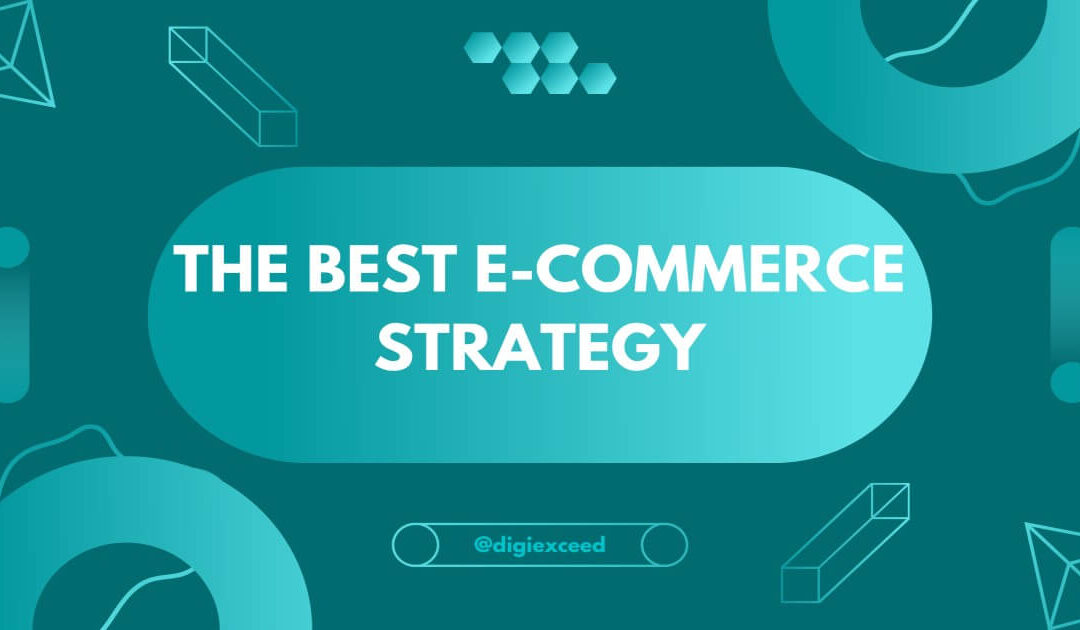Ecommerce SEO is simply a method for increasing traffic to your website. It’s an umbrella term for various optimisation techniques that will help your page rank higher in search engines. E-commerce, also known as Electronic Commerce SEO, refers to the purchase and sale of goods and services over the Internet.
Typically, e-commerce SEO refers to the online sale of physical goods, but it can also refer to any commercial transaction facilitated by the Internet. The first online sale occurred in 1994 when a man sold a Sting CD to a friend via his website Net Market, an American retail platform. This is the first instance of a consumer purchasing a product from a business via the World Wide Web, also known as e-commerce. Following that, e-commerce SEO evolved to make discovering and buying products easier through online retailers and marketplaces. E-commerce has benefited all freelancers and small and large businesses by selling their goods and services on a scale that was not possible with traditional offline retail.
The E-Commerce website contains confidential information provided by customers, such as their password, contact information, and credit card details. Still, when it comes to commercial deals between organisations and individuals requiring a selective information system under the firm’s guarantee, it accepts the form of e-business.
How to improve your ecommerce SEO
Find Keywords That Are Both Relevant and Optimised
For eCommerce SEO strategy, keywords are the most crucial factor to consider; therefore, keep an eye out for them while searching for keywords for your e-commerce platform. It would help determine a keyword’s search volume, cost-per-click, user purpose for choosing that keyword, and other factors before putting it on a product or category page. Meanwhile, long-tail keywords are preferred since they match user intent and enhance conversion rates. If your website sells men’s clothing, for example, you may use keywords like a red cotton t-shirt for boys, blue round-neck men’s shirt, and so on. You may use various keyword research tools to locate appropriate and optimised keywords for your website.
- Keyworddit
- SEMrush
- Keyword In
- WonderSearch, and so on.
And these keywords should not be overused or crammed into the web page.
Concentrate on On-Page SEO
On-page ecommerce SEO strategy has traditionally been the most critical aspect in determining where a website will appear in search engine results pages. In the context of an eCommerce site, On-Page SEO refers to the process of optimising product and category pages to rank higher for specific keywords and increase relevant traffic and conversion rates. Some essential On-page SEO techniques.
- Use meta titles and descriptions that are optimised.
- Use URLs that are keyword-rich and short.
- Include primary and LSI keywords in product descriptions.
- Make use of Schema Markup.
- Make internal links, for example.
Meanwhile, you may improve your results by using accurate, relevant, high-quality photos or other infographics. Also, when performing On-page SEO for your eCommerce site, consider not just the search engine position but also the user experience, as a positive user experience will encourage visitors to return to your site.
Create one-of-a-kind product descriptions for each item.
Some helpful hints for crafting a product description are listed below:
- Try writing product descriptions that are approximately 1000 words long.
- Use the core term 3-5 times in the report.
- LSI keywords should be sprinkled liberally (without stuffing irrelevant).
- Add modifiers like “Buy” and “Sale,” as well as click-magnet keywords like “50% OFF,” “Free Shipping,” and so on.
- The product’s specifications and necessary details should be highlighted.
Boost the speed of your website’s loading
Let’s say you turn on your smartphone or laptop and go online to shop. You’re looking for a wristwatch for yourself, so you use search terms related to wristwatches. You open the first e-commerce site you find in the SERPs, and it takes more than enough time to load and browse. What would you do now? You will undoubtedly leave that site and visit another. That’s when things start to become interesting. High-resolution photos are a significant contributor to e-commerce site loading times. Even though e-commerce platforms rely heavily on product photographs, it is not advisable to compromise on image quality and standards in any case. As a result, you can optimise pictures and reduce file sizes without sacrificing image quality.
Keep the site safe.
Because an e-commerce platform deals with millions of users’ data and a significant number of transactions every day, it’s critical to keep the website secure. Furthermore, as the number of cyberattacks on e-commerce platforms rises, such as the leakage of banking credentials, account hacking, and so on, people are becoming more cautious and demand a more secure website. Yes, when it comes to ranking your site on SERPs, the search engine considers the security degree of your site. The first and most important thing you must verify is that your e-commerce site has an HTTPS and SSL certification to protect sensitive data or information.
Also, you should always back up your site’s data so that if it is broken or disrupted, you can quickly restore it without bothering your users. You can also remind your users to change their account passwords regularly and keep your website up to date to reduce the danger.
Keyword Optimization for Ecommerce
The key to success in SEO, as most SEO professionals already know, the key to success in SEO is focusing on the right keywords. Writing how-to guides and other content appears to be simple.
What about online shopping?
If you truly want to sell your products on your online ecommerce site, you must target keywords from a unique perspective. Knowing about the products your company sells is less significant than understanding your consumers’ search behaviour for your product. The essential factor is the level of keyword competition. Some keywords are used by several companies in the market, making ranking for these terms extremely difficult. You might try looking for long-tail keywords that are less frequent. These keywords may aid in your company’s ranking on search engine results pages (SERPs). Also, make your site user-friendly; keyword optimisation might be tough without a good basis.
Investigate Your Rivals
Before you can analyse your SEO competition, you must first comprehend it. Your SEO competitors might not be the same as the rest of your competitors. So, who exactly are these foes?
They’re the trades that show up first in searches for your industry’s most crucial keywords. You can use Ahrefs to look at the keywords at the top of the search engine results pages. Make a list of relevant keywords, but more importantly, use it to find content gaps. Gaps might be found in your customer’s terminology, but your competitors don’t. The content gap part of Ahrefs also has these details.
Principal Keywords
Because situations are rarely ideal, ecommerce keyword research is critical. It provides you with a list of target keywords that are easy to rank for has a high search volume and high conversion rate.
Before choosing keywords for which you can rank, keep in mind the number of individuals that search for these terms. With the best keywords, buyer intent is also back. Now that you know what terms to hunt for, you must be considering the next step: conducting ecommerce keyword research.
Find Keywords Using SEO Tools
Semrush, Ahrefs, and Google Keyword Planner are well-known ecommerce SEO tools. One is suitable for keyword research, competitor analysis, and backlinking.
How to choose an ecommerce SEO agency?

Search Engine Optimization is a process that is constantly evolving in response to changes in search engine algorithms. These algorithms are becoming more intelligent to provide a better user experience. Your company’s value proposition may be strong, but you must also demonstrate it to search engines. Ranking high on your audience’s preferred search engine is complex, with over 89,000 Google searches per second.
Finding the right ecommerce SEO agency can be difficult because many companies provide eCommerce marketing services, including organic ecommerce SEO strategy agencies. You don’t want an eCommerce SEO agency to learn about SEO at the expense of your website.
Additionally, an agency’s years of experience can significantly improve the quality of eCommerce marketing services. According to a survey of 6,000 marketing agencies, 37% had experience ranging from 10 to 15 years. Find an agency with 10+ years of experience, as their expertise accumulated over the years is what sets them apart from the competition.
SEO for ecommerce product pages would help if you also attempted to comprehend their thought leadership in the field of SEO. If they have a blog, the topics and content will assist you in understanding their skill set. Examine the quality of the ideas posted on their social media pages.
Client questions and metrics that demonstrate the agency’s effectiveness
The best way to evaluate an ecommerce SEO agency‘s past performance is to review its client list. Please request it even if the portfolio is not available on the website. It is always advantageous to find an agency that has worked with clients in your industry. More information than their client list is required to evaluate their SEO performance.
It will be beneficial to inquire about the results obtained for their clients, such as increases in rankings, traffic, and conversions. After you’ve reviewed their portfolio, feel free to ask for references. After signing the contract, ask past or current clients about their experiences to get a true sense of the agency’s professionalism. Choosing the best eCommerce SEO agency can be difficult. However, armed with the right questions, you can shortlist proven performers while eliminating those who will not add much value to your SEO goals.
Inquire about how your SEO goals are aligned.
You can begin by aligning your SEO goals, which may be helpful when looking for a digital agency. While the ultimate goal of every business is to rank higher and receive more traffic, it is critical to have specific SEO goals. Some examples of SEO objectives are as follows.
- Increase organic traffic by x%
- Boost your search engine rankings
- Increase the page speed by x%.
- Increase your domain authority
- Reduce your website’s bounce rate. Increase the average time spent by visitors. Increase the number of pages viewed.
- Make more backlinks.
When speaking with eCommerce marketing agencies, consider tracking their metrics and how frequently they report progress. You should also be clear on the critical keywords to your business. However, if those keywords are irrelevant to your business, the improved orders will be ineffective. Transparency about SEO goals and regular reporting can help you get the most out of your SEO agency.
Why do you need ecommerce SEO
Ecommerce SEO strategy template is required to increase the profitability of your e-commerce website, whether your company is large or small, a bootstrapped startup or a Fortune 500 corporation. The advice I’ll give you in this report is based on my 10+ years of hands-on, real-world SEO and e-commerce experience. In most cases, organic search will be one of your top revenue generators.
The way technology has progressed throughout the years has affected how consumers purchase products. With 89 per cent of consumers utilising search engines to inform their buying decisions, search has become a vital part of the decision-making process. If your revenue dropped by 50%, warning bells would go off immediately; nevertheless, nothing happens when you miss an opportunity to increase by 50%.
SEO is a Method Of Increasing Profits
Most successful customers devote most of their time and resources to activities critical to achieving their objectives while reducing their time and resources in areas with less promise or impact. Suppose the fundamentals of your sales and marketing strategy include a precise analysis of your situation, market, and competitors, and your plan is tailored to your resources and strengths. In that case, your efforts will be more cost-effective.
In highly competitive industries and niches, paying for website traffic can cost hundreds of dollars per click. Alternatively, you may feel obligated to purchase costly banner ads. If you use good SEO, you would be much less dependent on this traffic. Of course, you can still buy advertisements. SEO efforts to improve websites for Google have been prioritized by successful e-commerce businesses (and other search engines).
Small Norwegian local e-commerce websites have dominated niches in the face of tough competition from large worldwide companies, in my experience. Surprisingly, they accomplish this despite having tiny budgets and minimal resources. A few have achieved success following a simple fundamental ecommerce Seo strategy.
These successful businesses have a distinct mentality. Their approach, preparation, and planning are all distinct. They work with an expert SEO consultant to integrate SEO into a larger marketing strategy, connecting it with content and social media marketing activities.
The effects of SEO are long-lasting, making it a worthwhile investment.
Search engine optimisation produces focused, cost-effective, measurable, and long-lasting outcomes. When it comes to paid advertising, your traffic diminishes as soon as you stop paying. SEO continues to work 24 hours a day, seven days a week.
The long-term benefits of a good SEO strategy are apparent. Unlike most kinds of marketing, where you start from scratch each year, SEO grows to become more potent over time with the help of SEO services from ecommerce websites.
You can build on what you did last year and keep expanding until you own your speciality and have complete control of your market.
How to do international ecommerce SEO
Localisation is the foundation of a successful international SEO strategy. Your website must be tailored to your target audience’s language and preferences. However, in addition to localising your content for usability and accessibility, you will need to localise it to rank for relevant keywords. Assume you own a clothing store and are looking to expand into Mexico.
You should target “silk shirts for women” rather than “camisas de seda para Mujer.” With this in mind, you should entrust your foreign SEO strategy to a team that is a native speaker of your target market’s language. If you have a company blog, you should create content to attract your new target audience. But how do you make it happen?
Simply put, they should conduct queries that are specifically relevant to their country. However, in addition to targeting keywords, you’ll want to reflect their specific needs in your content. Assume you’re also expanding into Chile. Your Chilean customers will not feel cold during the holidays because of summer in the Southern Hemisphere.
As a result, if you’re writing a guide on how to dress for Christmas Eve, you should recommend light summer dresses rather than coats. And perhaps your special holiday offers should concentrate on summer clothing rather than winter coats.
- Increase the share-ability of your website.
- Prevent your users from leaving because they found your content frustrating and irrelevant.
- Assist you in creating value-driven customer experiences
- Make sales easier.
It’s not only about keywords and meta tags for SEO. Understanding your audience and developing a strategy to interact with them in a meaningful and competitive way is what SEO is all about. As a result, one of our SEO advice (and a localisation tip) is to learn everything you can about your target audience. Before you begin investing in localisation, you should determine whether there is a market gap in your target location that you can fill. You should understand your target audience, their (unmet) needs, and which trends are relevant to them. There is no technical trick or research tool that can compensate for this level of understanding. Make your SEO strategy as client- and user-centered as possible, and use qualitative research to inform and optimise it.
An SEO strategy assists you in increasing your visibility, understanding your customers, and tailoring your site to their needs.


